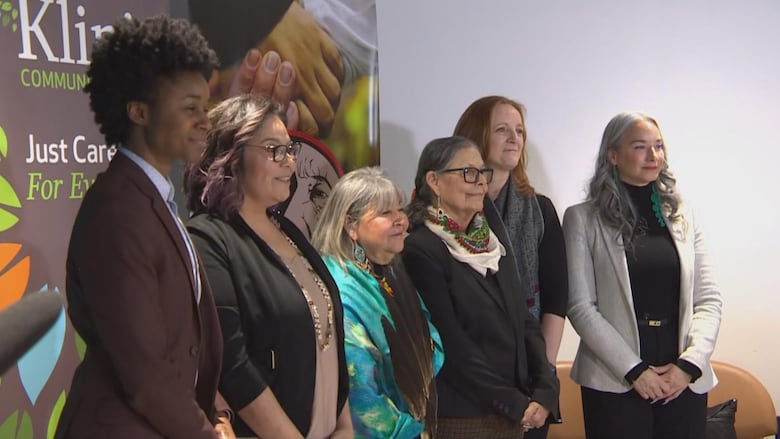Dozens of Manitobans have accessed supports for sexual assault survivors at Klinic, Ka Ni Kanichihk: province
Programs 1st announced last year are part of pledge for provincial sexual assault nurse examiner program: NDP

More than three dozen people in Manitoba have accessed expanded supports for survivors of sexual assault and intimate partner violence that launched just a few months ago, the province said Tuesday.
At a Tuesday news conference, provincial Families Minister Nahanni Fontaine and Health Minister Uzoma Asagwara outlined more details about how Klinic Community Health and Ka Ni Kanichihk will use $1.3 million in funding promised last year, under the previous Progressive Conservative government, to provide survivors with wraparound supports.
The funding, initially announced last April, was focused on expanding the province's sexual assault nurse examiner, or SANE, program.
The wraparound supports Ka Ni Kanichihk and Klinic will offer include forensic nursing services, such as physical examinations and the collection of evidence, as well as mental health, advocacy and Indigenous cultural supports.
"This relationship-based approach really helps to put power back into survivors' hands," said Dana Connolly, associate executive director with Ka Ni Kanichihk.
"With the community-based model, we're able to embed healing-centred, trauma-informed care in an environment where the community is already feeling safe."
The programs are just now officially launching, but soft-launched in October, officials said, and have already seen 38 survivors use the services.
Both organizations share 2.8 full-time equivalent nurses, in addition to their existing staff, as well as a nurse co-ordinator.
Klinic is currently providing services six days a week, including some evenings from Monday to Thursday. Ka Ni Kanichihk currently only offers services through its program Tuesdays and Thursdays from 8:30 a.m. to 4:30 p.m., but plans to expand its services in the coming months.
Klinic executive director Ayn Wilcox said her organization could have the capacity to help roughly 300 survivors a year.
SANE supports
Ka Ni Kanichihk, located in the West Alexander neighbourhood of Winnipeg, is an Indigenous-led organization that provides culturally safe supports.
Klinic, based in Winnipeg's West Broadway area, provides a full range of health-related services, including a 24/7 sexual assault crisis line.
Forensic nurses collect evidence that can be used in sexual assault investigations.
Last year, the Progressive Conservative government announced the funding so the two organizations would support the province's sexual assault nurse examiner, or SANE, program.
That was in response to about a third of the casual nursing pool working in the program at the Health Sciences Centre resigning amid complaints about inadequate staffing.

The Manitoba Nurses Union had warned earlier that year labour constraints were leading to gaps in care — and that some sexual assault survivors were being told to go home, do their best to preserve evidence and come back when the hospital was better staffed.
President Darlene Jackson said Tuesday her union has been advocating for a program like this for a long time.
"It's something that we need and something that our previous SANE nurses advocated for — you know, to have those supports in the community to allow ... sexual assault survivors to go where they need to be," she said.
"I cannot imagine how triggering it would be for a victim of sexual assault or intimate partner violence to attend a busy, noisy, loud and sometimes violent emergency department ... after having been traumatized by an attack."
3 out of 7 nurses hired
During last year's election campaign, the NDP — which won a majority government in the Oct. 3 election — pledged to hire more full-time nurse examiners if elected, including in rural and northern communities.
The NDP estimated that promise would cost the province $2.4 million a year.
The government said Tuesday the programs at Klinic and Ka Ni Kanichihk support its commitment to creating a strategy to improve access to SANE care provincewide.
That strategy would require seven nurses — three of whom have already been hired, Asagwara said.
"There is more work to be done, but certainly Manitobans deserve, survivors deserve to get the quality care they need in a timely way, no matter where they live across the province," the health minister said.
"There's a lot of folks who are going to be and are engaged in developing a true provincial approach to providing this care, which is long overdue."
'This is a reannouncement': PCs
But the Opposition Progressive Conservatives say they want to see what the NDP government's actual plan looks like, including whether it's realistic to have nurse examiners throughout the province when the health-care system is still struggling to fill some vacancies.
"This is a reannouncement for what the PC government announced last April.... So certainly glad to see that it is up and running," said Midland MLA Lauren Stone, the PC critic for families.
"When the PCs announced the expansion of this program, [the NDP] fear-mongered regarding this project because of the worldwide staffing shortages that we were seeing [in health care]. So I'd like to see what their plan is."
Jackson said that strategy won't progress "as quickly as some would like it to."
"These nurses need to be trained — they need to have education in forensic examination, in providing that care culturally sensitive and trauma-informed," the union president said. "This is not a skill that you learn overnight."
With files from Ian Froese